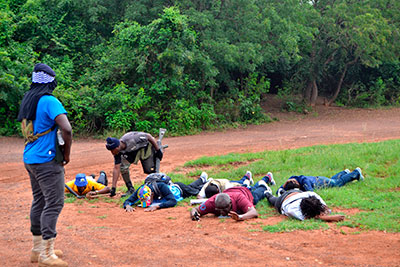Hostile Environment Awareness Training (HEAT) Course 1 of 2024
Peace and Security Studies

Course Fee: The course is fully sponsored by the German Government through KAIPTC. Accommodation, tuition and feeding will be borne through KAIPTC. Regarding international participants, KAIPTC will bear international air travel only. All travels by international participants in their respective countries are the responsibility of the individual participants. Additionally, participants will bear their own visa arrangement costs in their home countries. However, visa-on-arrival cost and other arrangements will be done by KAIPTC.
Terms and Conditions:
IMPORTANT NOTE: - The course will be conducted ONLY in English.
- Every participant will have to prove adequate health insurance coverage, which should include Covid-19. Additionally, participants must have been vaccinated and possess a COVID-19 vaccination card. Those not vaccinated must be ready to undergo a PCR test if need be. KAIPTC will not bear any health or accident costs for any participant.
- Participants are also to have valid travel health insurance at their own expense.
| In short | |
| Course Date/Duration | 20th May – 31st May 2024 |
| Maximum Course Capacity | 30 participants |
| Target Group | Civilians, Civil Police and Military personnel from ECOWAS Nations inclined to be deployed in peacekeeping |
| Course delivery language | English only |
| Application Deadline | 10 March 2024 |
Background
Although armed conflicts have been prevalent the world over, the African Continent is particularly faced with many of such conflicts. These conflicts have hindered development, thereby affecting the continents’ peace, democracy and prosperity.
The eruption of conflicts begins the mandating of mission to restore normalcy. Mission environments are mostly different from the regular work environments to which people are mostly accustomed. Mission environments are typically not very conducive in terms of general living conditions, weather, security, food, language, epidemic, exploitation of all kinds among others. Most of these situations are hostile and therefore requires that people who are deployed in such areas learn survival skills before or during the period of their deployment. The HEAT course therefore, is a training meant to provide military, police and civilians with the requisite knowledge and skills needed to work and survive in crises areas.
Course Aim
This course aims at equipping participants with knowledge of the various dangers in hostile environments and enhancing their skills/capacities on how to react appropriately when deployed in a hostile environment.
Training Objectives
The overall training objectives for the HEAT course are to:
- Enhance participant’s knowledge on hostile mission environments.
- Increase participant’s skills needed to operate in a hostile PSO environment.
- Equip participants with requisite knowledge/skills for survival and appropriate actions in critical situations.
Target Group/Course Capacity
This training is target at 20-30 participants from:
- Military, Civil Police and Civilians deployed in crisis areas.
- Personnel preparing to deploy in crisis areas.
- Mission Foreign Affairs/Embassy
Course Content
The HEAT training combines theoretical and practical sessions on the modules/topics below:
- Introduction to contemporary peace support operations (PSO).
- Living, working conditions and behaviour in mission environment.
- Stress Management.
- Mental Health Outcomes in Hostile Environment.
- Negotiations.
- Hostage Situations.
- First aid.
- Personal health and hygiene.
- IED / Mine Awareness.
- Introduction to map reading.
- Voice Procedure and radio communication.
- Practical Field Exercise.
Teaching Methodology
Participants will play active roles under the guidance of an experienced team of facilitators. KAIPTC courses are delivered within the framework of Collaborative Problem Based Learning (CPBL) methodology, which include:
- Lectures.
- Participatory discussions.
- Power point/presentations.
- Practical sessions / field exercise
How to Apply
Interested applicants are requested to kindly fill and submit an online application form, using the link that is provided and by pressing the “How to Apply” button
Selection Process
The selection process will involve review/screening of information/details submitted in the application via the KAIPTC application portal after which applicants will be shortlisted by a selection committee from the centre at the end of the deadline for application; which is 10 March 2024.
Contact
Mrs Marylyn Agblor
Training Coordinator
Tel. [233 (0) 302 718200 Ext. 1012]
Fax. [233 (0) 302 718201]
Email: marylyn.agblor@kaitpc.org or training.coordination@kaiptc.org
Colonel Emmanuel Larbi Sarpong Gyadu
Course Director
Tel : +233 302 718 200 Ext 1992
Mobile: + 233 203754355
Email: emmanuel-larbi.gyadu@kaiptc.org

